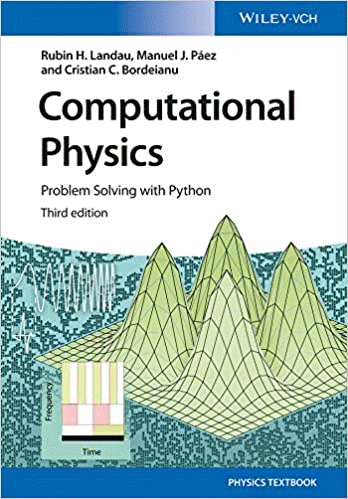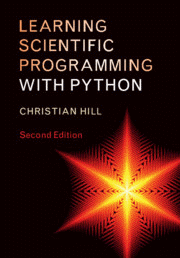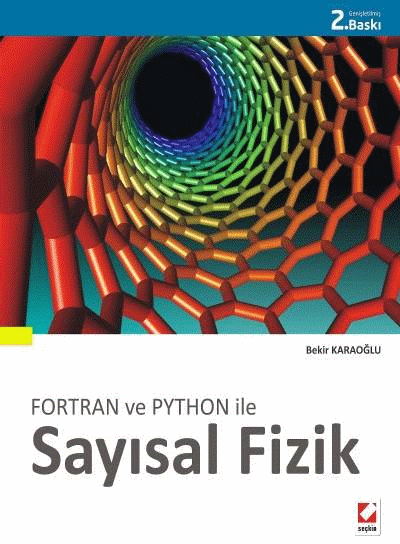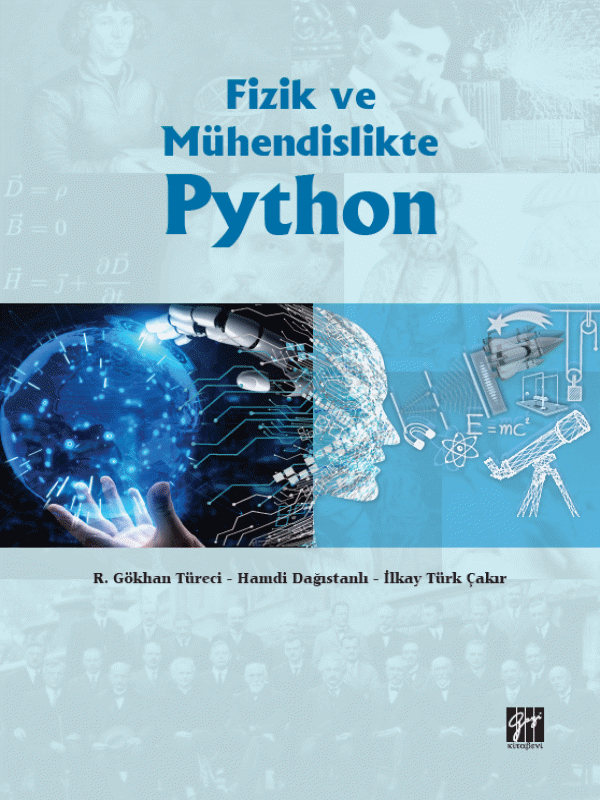IKC-MH.55
Scientific Computing with Python
2022-2023
Spring
Most
recent announcement: June
20
TIME
|
MONDAY
|
TUESDAY
|
WEDNESDAY
|
THURSDAY
|
FRIDAY
|
|
8:30
|
|
|
|
|
|
|
|
9:30
|
|
|
|
|
|
|
|
|
10:30
|
|
|
|
|
|
|
|
|
11:30
|
|
|
|
|
|
|
|
12:30
|
|
|
|
|
|
|
|
13:30
|
|
|
|
|
|
|
|
14:00
|
|
|
|
|
IKC-MH.55
|
|
|
15:00
|
|
|
|
|
IKC-MH.55
|
|
|
16:30
|
|
|
|
|
|
|
|
|
|
|
|
|
|
|
|
Instructor
Cem
Özdoğan
office:
Faculty of Engineering and Architecture
Department of
Engineering Sciences, H1-33
office
hours: Schedule
or appointment by email, or drop by
anytime
office phone: 329
3535 / 3803
email address:
cozdogan11@gmail.com
cem.ozdogan@ikc.edu.tr
|
TA
Not Available
office:
office hours:
office phone:
email address:
|
Announcements
Watch this space for the latest updates (If the
characters do not show properly, please try viewing this page with
Unicode (UTF-8) encoding). Last updated:
Tue, June 20, 2023
Final
Examination
grades are available, see Course
Schedule section
Thu, June 1, 2023
Final
Examination
will be as take-home work, see Course
Schedule section
Thu, June 1, 2023
Midtem
Examination grades are available, see Course
Schedule section
Mon, May 22, 2023
Lecture
notes for week12
is
published, see Course
Schedule section
Mon, May 22, 2023
Lecture
notes for week11
is
published, see Course
Schedule section
Wed, May 3, 2023
Lecture
notes for week10
is
published, see Course
Schedule section
Mon, April 17, 2023
Lecture
notes for week9
is
published, see Course
Schedule section
Mon, April 17, 2023
Lecture
notes for week8
is
published, see Course
Schedule section
Mon, April 17, 2023
No
lecture at week7. Midtem Examination will be as take-home work,
see Course
Schedule section
Mon, April 3, 2023
Lecture
notes for week6
is
published, see Course
Schedule section
Thu, March 23, 2023
Lecture
notes for week5
is
published, see Course
Schedule section
Thu, March 16, 2023
Lecture
notes for week4
is
published, see Course
Schedule section
Wed, March 8, 2023
Lecture
notes for week3 is published, see Course
Schedule section
Thu, March 2, 2023
Lecture
notes for week2
is
published, see Course
Schedule section
Thu, February 23, 2023
In the first lecture,
there will be first meeting. The lecture notes will be published
soon, see Course
Schedule section.
Back to top
Lecture Information
Python
is a well-designed, modern programming language and widely used in
computational science and engineering. It is a powerful tool since It
includes a wide range of features tailored for scientific computing.
This course is not either a numerical methods or a programming python
course. However, this course is designed to use computer programming
to implement numerical algorithms for
solving physics/engineering problems. Consequently, Python
(fundamentals of programming in Python, NumPy,
SciPy, Matplotlib libraries)
and some numerical techniques (practice at physics/engineering
problems) will be learned implicitly. You may
be
expected to do significant programming
and
problem solving. An understanding of the concepts
of
elementary calculus, in particular solutions of differential
equations and Newtonian/wave mechanics are
required
but not mandatory since they
will
be explained as needed. Important announcements will be posted to the
Announcements
section
of this web page,
so please check this page frequently. You are responsible for all
such announcements, as well as announcements made in lecture.
Back to top
Course Overview
IKC-MH.55
is
intended to provide students a
practical introduction for
using
the computer as a tool to solve physics and engineering problems. The
fundamental advantage of using computers in science
is
the ability to treat systems that cannot be solved analytically. So
that computing has become a major tool in science/engineering and it
is called the third pillar along with experiments and theory.
Numerical techniques such as: Interpolation & Model Fitting,
Derivatives & Integrals, Basic Linear Algebra, Eigenvalue
Problems, Differential equations, ODE and PDE solvers are used to
solve problems from all areas of science and engineering. Python
implementation of these algorithms will be covered only whenever
necessary in the context of the course. Each class will be focused
towards solving a particular physical/engineering problem. Problems
will be drawn from diverse areas of real-life examples as much as
possible. Theory or model, method of solution/algorithm, solution
implementation (analytic, Python) and visualization/exploration will
be outlined for the problem description.
Upon
completion of this course the students will be able to
understand/explain/apply;
Learn
how to work in a scientific computing environment.
Get
familiarized with Python as a programming language for numerical
computation.
Learn
how to solve physics/engineering problems using numerical
techniques.
Can
solve demanding tasks with Python.
Learn
to analyze problems, select appropriate numerical algorithms to
solve the problem, implement them using Python.
Possess
the basic knowledge of numerical modeling, data analysis and
visualizing large amount of data.
Back to top
Text Book
Lecture
material will be based on them. It is strongly advised
that
student should read textbooks rather than only content with the
lecture material supplied from the lecturer.
Required
|
Recommended
|
|
Computational
Physics: Problem Solving with Python
by
Rubin H. Landau, Manuel J. Páez, Cristian C. Bordeianu
3
rd Edition,
2015
Wiley
|
Learning
Scientific Programming with Python by Christian Hill
2nd
Edition, 2020
Cambridge
University Press
|
Fortran
ve Python ile Sayısal Fizik
by
Bekir Karaoğlu
2.
baskı, 2013
Seçkin
Yayıncılık
|
Fizik
ve Mühendislikte Python
by
R. Gökhan Türeci, Hamdi Dağıstanlı, İlkay Türk Çakır
2021
Gazi
Kitabevi
|

|

|

|

|
Back to top
Online Resourcess
The following resources are available online. Please
inform me about the usefullness of the materials. Check this place
for updates.
Back to top
Grading Criteria
Midterms & Final Exams:
There will be one midterm and one final exam, will count 30% each
and 40% of your grade, respectively.
Homeworks/Assignments (or
Term Project):
30%.
Back to top
Policies
You can use
ideas from the literature (with proper citation).
You can use
anything from the textbook/notes.
Exams: 1
page of notes (double sides) is allowed.
I encourage
you to ask questions in class. You are supposed to ask questions.
Don't guess, ask a question!
Back to top
Tentative Course Outline
Back to top
Tentative
Course
Schedule &
Lecture Notes
The following schedule is tentative; it may be
updated later in the semester, so check back here frequently.
Week
|
Topic
|
Lecture Notes
|
Quizes
|
Homeworks
|
Pdf
|
Py
|
Pdf
|
Pdf
|
Grades
|
Grades
|
Lectures
|
1
|
First Meeting
Lecture
Information. Installation of Linux system and required
tools/programs using VirtualBox in Windows environment
(kubuntu-22.04.1-desktop-amd64.iso
& VboxGuestAdditions_6.1.38.iso)
|
pdf
|
html
|
NA
|
2
|
Introduction I
Introduction to Python and
Scientific Packages:
Programming
in Python, Use of the NumPy/SciPy
library,
Plotting and Visualization with Matplot
|
pdf
|
Hands-On
|
NA
|
3
|
Introduction
II
Numerical
Fundamentals: Numbers, Errors.
|
|
|
NA
|
pdf
|
Hands-On
|
4
|
Numerical
Techniques: Root Searching
Blackbody
Radiation
|
pdf
|
Hands-On
|
NA
|
5
|
Variable
Force in One Dimension, Simple Pendulum
|
pdf
|
Hands-On
|
NA
|
6
|
Numerical
Techniques: Differential Equations - Initial Value Problems
Projectile
Motion with Air Resistance, Planetary Motion
|
pdf
|
Hands-On
|
NA
|
8
|
Numerical
Techniques: Differential Equations - Boundary Value Problems
Laplace
Equation in Electrostatics
|
pdf
|
Hands-On
|
NA
|
9
|
Numerical
Techniques: Differential Equations - Eigenvalue Problems
Wave
Motion Along a Spring, Hydrogen Atom
|
pdf
|
Hands-On
|
NA
|
10
|
Numerical
Techniques: Differential Equations - Legendre polynomials &
Hermite Polynomials
Quantum
Harmonic Oscillator
|
pdf
|
Hands-On
|
NA
|
11
|
Numerical
Techniques: Linear Algebra and Matrix Computing I
Kirchhoff’s
Rules
|
pdf
|
Hands-On
|
NA
|
12
|
Numerical
Techniques: Linear Algebra and Matrix Computing II
Normal
Modes of Oscillations
|
pdf
|
Hands-On
|
NA
|
13
|
Data
Analysis: Series Expansion, Interpolation and Data Fitting
Millikan
Oil Drop Experiment
|
pdf
|
html
|
NA
|
14
|
Numerical
Techniques: Differential Equations
Lagrange
Dynamics in Mass-Spring System
Numerical
Techniques: Differential Equations
RLC
& RC Circuits
|
NA
|
Exams
|
7
|
Take-home Midterm Examination
|
Solutions:
|
pdf
|
pdf
|
html
|
html
|
15
|
Take-home Final Examination
|
June 20, 2023
01:26 AM
Grades
|
pdf
|
html
|
Back to top
References (other than text books)
Back
to top



